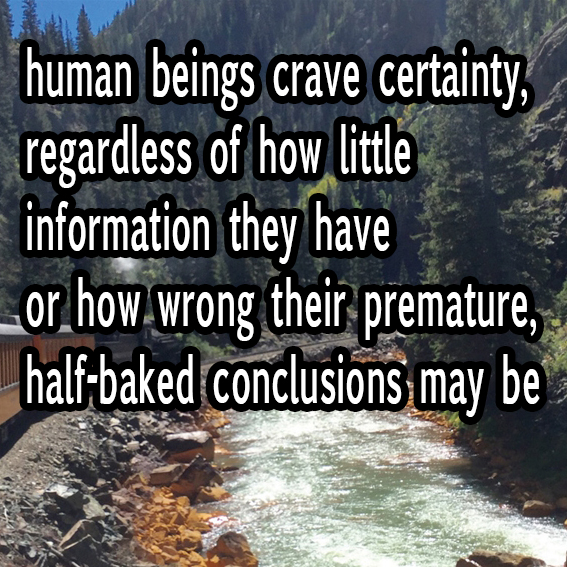Armchair psychology
Everybody thinks they’re a psychologist. It’s apparent in my routine interactions with friends, family and acquaintances outside my clinical office. People constantly diagnose themselves and others, asserting causal explanations for why they’re thinking/feeling/doing what they are, instead of what they “should” be—in the speaker’s opinion, of course, though it’s usually presented as fact.
 The same happens within my consulting room. Although folks may present as curious or confused, with questions about themselves or important relations, what they mostly bring in are the answers upon which they’ve already settled. These are implicit, deeply and rigidly held convictions that may be disavowed by, or even unknown to, the person holding them.
The same happens within my consulting room. Although folks may present as curious or confused, with questions about themselves or important relations, what they mostly bring in are the answers upon which they’ve already settled. These are implicit, deeply and rigidly held convictions that may be disavowed by, or even unknown to, the person holding them.
It would be naïve for me to expect anything different. Yes, after earning an undergraduate degree in this field, I spent eight additional years in graduate school, which included an intensive yearlong internship at a Harvard Medical School teaching hospital. I have 30 years of practice under my belt as a full-fledged PhD, and a decade of related work prior. I could get huffy about “less qualified” people opining as though they have as much expertise and authority as I do, especially when they dismiss my perspective as over-complicated nonsense. But I’d be a lousy psychologist if I didn’t appreciate: a) everyone must learn to navigate life by developing theories about themselves, others and how relationships work, and b) human beings crave certainty, regardless of how little information they have or how wrong their premature, half-baked conclusions may be. Hence, it’s inevitable everyone becomes a psychologist of sorts, and assumes they know the topic perfectly well.
Listen to this column as Episode 28 of The Ride Inside with Mark Barnes. Submit your questions to Mark for the podcast by emailing [email protected].. (Audio available from 22 July 2023; until then it will display “Unable to load media.”)
In an ideal world, we would all learn what we need to know about psychology by growing up within a matrix of nurturing, instructive relationships. We’d understand our own interiors because others understood them first and then engaged us with accurate empathy, making us understandable and acceptable to ourselves. (This has nothing to do with overly permissive, indulgent parenting—consistently applied behavioral expectations and contingencies are essential to effective child-rearing, but that’s another discussion.) We’d come to understand others because they expressed themselves plainly and explicitly, and their words and actions lined up. And we’d understand human relations reasonably well because we’d have conceptual models from our own familial experiences we could apply successfully to an expanding set of interactions elsewhere.

I hate to break this news to you, dear reader, but unfortunately the world is not ideal. Children are often left to figure out for themselves many things beyond their grasp. They develop simplistic explanations, usually based more on hopeful or fearful fantasy than on reality, or they produce models which do truly reflect the realities of their early history, but don’t work when applied to the world beyond their original family or childhood circumstances. Nevertheless, such models have been ingrained and resist change, even in the face of overwhelming evidence to the contrary, because they were once absolutely necessary for navigation and survival. Any move toward letting go of them sets off extremely compelling internal alarms.
As a result, we all enter adulthood steeped in psychological education containing varying degrees of distortion in how we see ourselves and formulate what makes others tick and what’s likely, or even possible, in relationships. If our distortions are relatively few and minor, we move through life fairly well; we’re sufficiently oriented to find success and satisfaction. Further, if our distortions are numerous or severe, we run into serious trouble, without really knowing how or why we keep landing in the same predicaments, much less how to make things better. The worst part is we don’t know that we don’t know. By definition, we can’t see our own blind spots, and we need to believe we know what’s true and real in order to feel secure.
 People don’t come to me at the first sign of trouble. They’ve generally exhausted all other options and held out hope the solutions they’ve used in the past would somehow finally deliver the desired improvements. Albert Einstein is credited with the quote, “Insanity is doing the same thing over and over again, expecting different results.” Those words certainly contain truth, but this approach is so ubiquitous we’re all insane by his definition, just to varying degrees. Most who enter my office don’t actually seek personal change at first. Instead, they insist, overtly or covertly, their longstanding strategy should work, but others have refused to cooperate for illegitimate reasons. They plead their case as though I could somehow make these things “right,” or at least commiserate with them about how “wrong” situations and other people are.
People don’t come to me at the first sign of trouble. They’ve generally exhausted all other options and held out hope the solutions they’ve used in the past would somehow finally deliver the desired improvements. Albert Einstein is credited with the quote, “Insanity is doing the same thing over and over again, expecting different results.” Those words certainly contain truth, but this approach is so ubiquitous we’re all insane by his definition, just to varying degrees. Most who enter my office don’t actually seek personal change at first. Instead, they insist, overtly or covertly, their longstanding strategy should work, but others have refused to cooperate for illegitimate reasons. They plead their case as though I could somehow make these things “right,” or at least commiserate with them about how “wrong” situations and other people are.
My first task is figuring out what the person seeking my help believes they understand about themselves, others or relationships, but actually doesn’t—at least not well enough to deal with their present challenges. Then I have to find ways to make bitter pills possible to swallow. Enlightenment is painful, involving mourning the loss of cherished, albeit perhaps previously unrecognized, certainties—and feeling the accompanying fear of disorientation in a world rife with dangers and difficulties. This process bears little resemblance to the “warm fuzzy” notions of psychotherapy in pop culture, although the anguish involved is indeed mitigated by a good therapist’s supportive presence and careful pacing. As the dust settles, improved understanding unlocks new possibilities, fresh perspectives, behavioral shifts, emotional relief (eventually), and relational change. When it goes well, people become better psychologists than what their original training allowed. While this may be radically different than what they had originally sought, the outcome ultimately feels worth the unexpected struggle.
You might wonder what all this has to do with motorcycles. Nothing at all—but it has everything to do with motorcyclists. This column was prompted by a reader’s comment that the people he’s met who don’t believe in ADHD haven’t had a child with it or struggled with it themselves. This is all too common across all categories of psychological problems. I frequently encounter the attitude that such maladies are just excuses for laziness, irresponsibility, self-pity, entitlement, dependency, and myriad other moral failings. Not only do many view others through this critical lens, they condemn themselves in the same way when struggling with their own issues. Whether directed at someone else or oneself, such judgments add yet another layer of misery to the mix. And they interfere with understanding and resolving difficulties; they short-circuit the process by substituting prefabricated, preemptive, and grossly oversimplified explanations for genuine exploration.
In virtually every case, these ready-made models have roots in the person’s early experiences. For example, a child’s normal, legitimate emotional needs may have been more than his/her already overtaxed parents could bear. A highly effective way of shutting down a child’s burdensome pleas for help is to shame them for wanting assistance. The child internalizes this “lesson” and feels a prohibitive level of shame whenever a sense of need arises, typically throughout the rest of their life. They may also shame others who are less inhibited about seeking help with problems. The ideal of independence is held too high, beyond what is humanly possible. It gives cover to the person who has no help to offer, either because the scarcity of their own resources precludes generosity or the pride accompanying condemnation of the “weaker” party is too enticing. Total self-reliance is a myth, not a realistic aspiration.

The hope behind this counterproductive approach is that anyone with a problem can simply be shamed out of it, or the problem will go away because it’s been discounted as “all in their head.” Sadly, this stance is usually the legacy of a childhood in which the accuser’s own difficulties were dealt with in exactly this way by those they looked to for help. The person in distress may learn to squelch direct expression, and even foreclose their own awareness of disturbing things inside them (which will, nevertheless, continue to exert influence from the shadows). They may come to view themselves as fundamentally inadequate or bad, given this rejection of aspects of themselves over which they have no real control, and spend tremendous energy concealing what they now consider unacceptable. While they may indeed be powerfully motivated by rejection and shame, what they typically achieve is not mastery over the real issues, but the construction of a self-sufficient facade (along with hardened expectations that everyone else do the same), and a fierce determination to avoid anything that threatens to reveal the difficulties that remain unaddressed. No one can fix what they hide.
The dismissed or condemned psychological problems may reflect faulty brain mechanisms, whether caused by congenital glitches, disease, or injury. Anyone who thinks we have minds independent of our brains has never known someone before and after a traumatic brain injury or the onset of dementia. Or, even if they accept those folks haven’t “chosen” to be disabled, they may not realize our brains can malfunction for countless other physiological reasons that are far more subtle and not accompanied by gaping head wounds or old age. ADHD, autism, learning disabilities, mood instability, impulse control deficits and many other crippling conditions can arise from biological factors that steamroll will power. Sure, people can learn coping strategies that diminish some of the negative effects, but doing so requires an accurate understanding of the problem as something other than a shameful character flaw.
I don’t mean to reduce everything to biology. Psychological problems also arise from our experiential histories, both early (even earlier than we can recall) and throughout our lives after childhood. We adapt to the threats and incentives we’ve encountered in the past, which is advantageous—as long as we remain in those circumstances. However, when our situations change, we may continue to perceive and react as though they haven’t, which puts us out of sync with our environment and the people in it and ensures our efforts will be misguided and unsuccessful. Depression, anxiety, rage, interpersonal strife/isolation, and disconnection from reality are just some of the possible consequences. With or without neurophysiological impediments, we all face a steep climb when trying to reprogram our mental software. Only in the most superficial examples can people simply decide to think/feel/behave differently because it makes more sense to do so. Most I’ve worked with could (at least eventually) recognize the irrationality and destructiveness of their persistent patterns, yet substantive change still required tremendous perseverance over prolonged periods of time beyond that realization.
No doubt, there are people who exaggerate their hardships, manipulate others into coddling them, evade responsibility for their actions/inaction, and exploit the secondary gains of having a psychiatric diagnosis. But there’s a much larger number of people who downplay their difficulties and needs—to themselves and those around them—and don’t take seriously the detrimental effects of doing so. While plenty of silliness masquerades as psychological treatment, real experts actually do have something useful to offer those suffering from cognitive, emotional, and relational problems.
If your transmission started grinding, would you scold it for “just wanting attention” and expect the problem to be resolved? I don’t think so. Then don’t do the same with people around you, or with yourself.
Mark Barnes is a clinical psychologist and motojournalist. To read more of his writings, check out his book Why We Ride: A Psychologist Explains the Motorcyclist’s Mind and the Love Affair Between Rider, Bike and Road, currently available in paperback through Amazon and other retailers.




